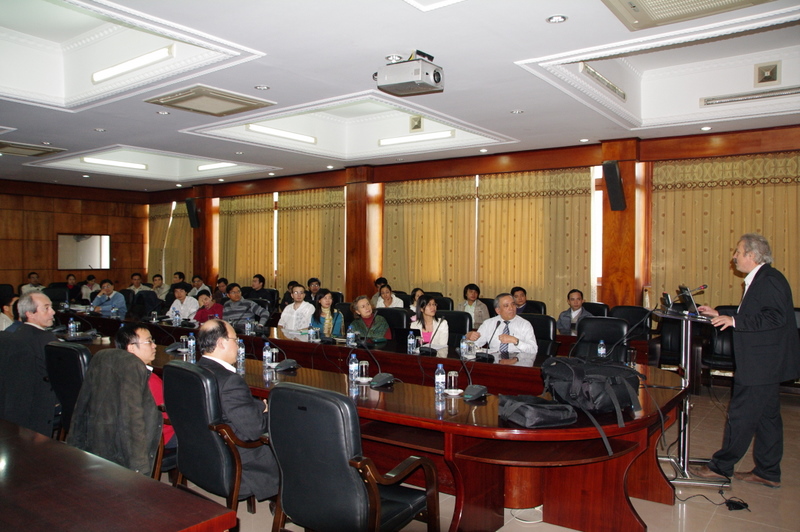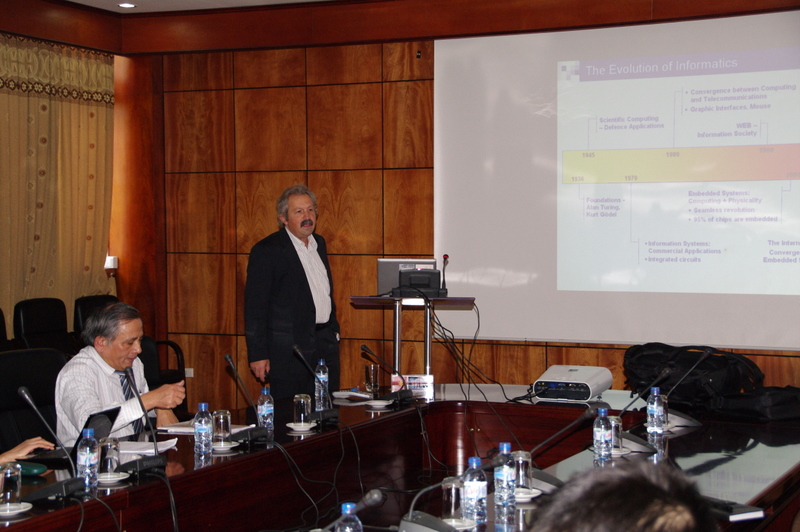![]() Joseph SIFAKIS, prix Turing 2007, a présenté ce lundi 23 novembre 2009, à l'Institut Polytechnique de Hanoi salle C1-222, ses travaux sur les systèmes embarqués intitulés "Embedded Systems Design – Scientific Challenges and Work Directions", devant de nombreux chercheurs et étudiants masters.
Joseph SIFAKIS, prix Turing 2007, a présenté ce lundi 23 novembre 2009, à l'Institut Polytechnique de Hanoi salle C1-222, ses travaux sur les systèmes embarqués intitulés "Embedded Systems Design – Scientific Challenges and Work Directions", devant de nombreux chercheurs et étudiants masters.
|
La conférence a été organisée par le Centre MICA. Elle a fait suite à l'accueil de M. Joseph SIFAKIS par le Président de l'Institut Polytechnique de Hanoi, PR Nguyen Trong Giang. M. Sifakis a profité de sa présence à l'IPH pour visiter l'Ecole des Technologies de l'Information et de la Communitation et le Centre MICA, pour discuter de coopérations scientifiques. |
 |
Intervenant:
M. Joseph SIFAKIS, Directeur de Recherche CNRS
Directeur du laboratoire VERIMAG, Grenoble
Prix TURING 2007 d'informatique
Date : lundi 23 novembre 2009, 14h30
Lieu : salle C1-222, Institut Polytechnique de Hanoi
Résumé/Abstract:
The development of a satisfactory Embedded Systems Design Science provides a timely challenge and opportunity for reinvigorating Computer Science.
Embedded systems are components integrating software and hardware jointly and specifically designed to provide given functionalities, which are often critical. They are used in many applications areas
including transport, consumer electronics and electrical appliances, energy distribution, manufacturing systems, etc.
Embedded systems design requires techniques taking into account extra-functional requirements regarding optimal use of resources such as time, memory and energy while ensuring autonomy, reactivity and robustness.
Jointly taking into account these requirements raises a grand scientific and technical challenge: extending Computer Science with paradigms and methods from Control Theory and Electrical Engineering. Computer Science is based on discrete computation models not encompassing physical time and resources which are by their nature very different from analytic models used by other engineering disciplines.
We summarize some current trends in embedded systems design and point out some of their characteristics, such as the chasm between analytical and computational models, and the gap between safety critical and best-effort engineering practices. We call for a coherent scientific foundation for embedded systems design, and we discuss a few key demands on such a foundation: the need for encompassing several manifestations of heterogeneity, and the need for design paradigms ensuring constructivity and adaptivity.
We discuss main aspects of this challenge and associated research directions for different areas such as modelling, programming, compilers, operating systems and networks.
Quelques photos :
 |
 |
 |









